Anxiety almost twice as prevalent among younger Canadians
January 24, 2022 – Entering the third year of the pandemic, the picture of mental health in Canada is one of exhaustion and increasing trauma.
A new study from the Angus Reid Institute finds a population largely fatigued, frustrated, and anxious – and one-in-three (36%) Canadians saying they are struggling with their mental health.
This represents an increase from the one-quarter who said so in November, prior to Omicron becoming the dominant COVID-19 variant in Canada.
When asked to summarize their feelings in recent weeks, half (48%) of Canadians say they’ve been feeling “fatigued,” while two-in-five (40%) say they’ve been frustrated, and another two-in-five (37%) say they’ve been feeling anxious. One-in-ten (12%) chose happy, half the number who chose depressed (23%).
Overall, three-in-ten Canadians say they speak regularly about their mental health with friends (30%) or family (32%), but these conversations are particularly rare among men 55 and older. Just 11 per cent in that demographic group say they talk to their friends about how they’re feeling, while one-quarter (23%) talk to family. Women between the ages of 18 and 54 are much more likely to have this type of discourse, though fewer than half say this is a regular part of their life.
These conversations take on more importance when considering additional data in this study. One-in-three Canadians (35%) say that depression and anxiety are a major problem within their social circle; another half (48%) say it’s an issue they’re exposed to. Further, for those who perceive this as a challenge for their friends and loved ones, fully two-thirds (66%) say it has worsened during the pandemic. These same trends are noted for those who perceive people in their social circle dealing with addictions and alcoholism.
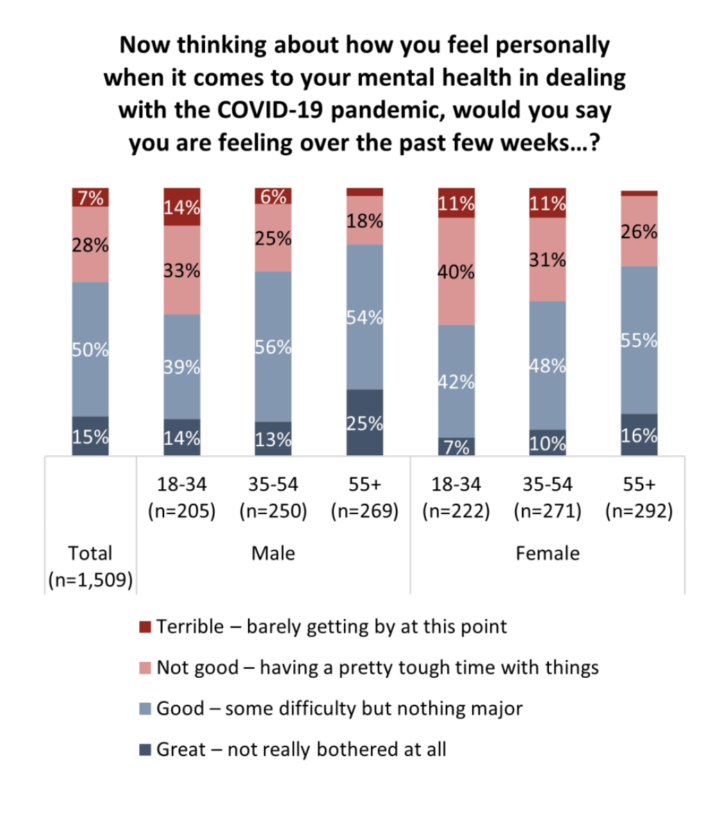
More Key Findings:
- Seven per cent of Canadians say they are “barely getting by” when it comes to their mental health in dealing with the pandemic, more than double the number measured at any point since October 2020.
- Those in Ontario (41%) and Saskatchewan and Manitoba (39%) are the most likely in the country to have been dealing with poor pandemic-related mental health in recent weeks, but at least three-in-ten in all regions report feeling not good or terrible.
- Three-in-ten (31%) say they or someone in their household had an appointment with a therapist, psychologist, or psychiatrist in the last year. Another three-in-ten (30%) say they’ve received a prescription to treat a mental health issue in the last 12 months.
- Meanwhile, men and women over the age of 54 are about half as likely to say they or someone in their household has had an appointment with a mental health professional or called a mental health hotline as their younger counterparts.
- Half (47%) of Canadians say alcohol abuse is a problem among their social circles while three-in-ten say the same of drug abuse.
About ARI
The Angus Reid Institute (ARI) was founded in October 2014 by pollster and sociologist, Dr. Angus Reid. ARI is a national, not-for-profit, non-partisan public opinion research foundation established to advance education by commissioning, conducting and disseminating to the public accessible and impartial statistical data, research and policy analysis on economics, political science, philanthropy, public administration, domestic and international affairs and other socio-economic issues of importance to Canada and its world.
INDEX
Part One: One-in-three having difficulty with mental health
- Half say they’re fatigued, many frustrated, anxious
Part Two: Depression, anxiety, and addiction
- One-third feel anxiety and depression ‘major problem’
- Anxiety, depression and addictions more prevalent among younger circles
- Two-thirds feel loved ones’ anxiety and depression have worsened during pandemic
Part Three: Let’s Talk? Significant age and gender divides over who opens up
Part One: One-in-three having difficulty with mental health
The COVID-19 pandemic appears to be taking an increasing toll on Canadians’ mental health. The demand for mental health-care has increased to the point where even psychiatrists are feeling burnt out and taking a step back from the profession to recover. Whether it’s the enforced social distancing, isolation, the fear of infection, or the result of public health restrictions keeping Canadians from activities they enjoy, there are myriad potential causes for negative mental health impacts.
Nearing the second anniversary of Canada’s first pandemic shutdown, mental health struggles among Canadians are rising. Prior to the Omicron wave, one-quarter (25%) said their mental health was not good. Now, one-third (35%) say they are struggling with their state of heart and mind, including seven per cent who say they are feeling terrible, nearly double the amount measured at any point since October 2020.
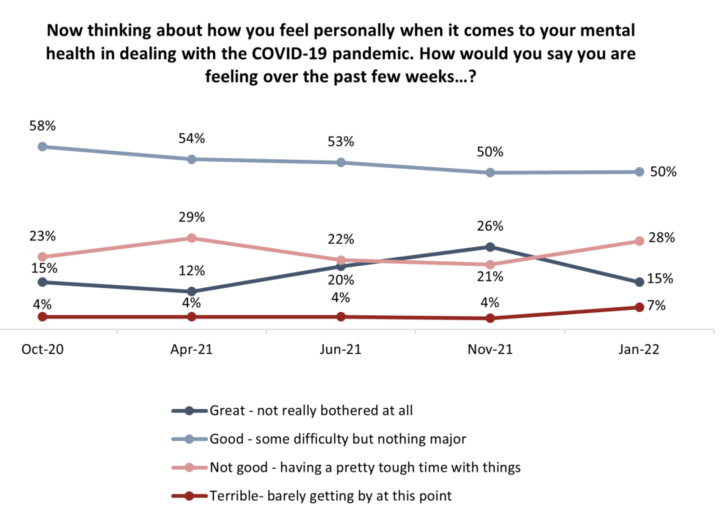
Younger Canadian adults disproportionately report feeling the mental health impact of the ongoing COVID-19 pandemic, despite the pandemic’s physical health impacts primarily afflicting older generations. Among those aged 18- to 34-years-old, half (47%) of men and (51%) of women say they’ve been feeling not good or terrible in recent weeks. Comparatively, four-in-five (79%) men aged 55 and older and seven-in-ten (72%) women that age say they are feeling good or great (see detailed tables).
Still, for older Canadians, this represents a low for mental health dating back to October 2020. Younger Canadians have consistently reported feeling worse mentally throughout that time:
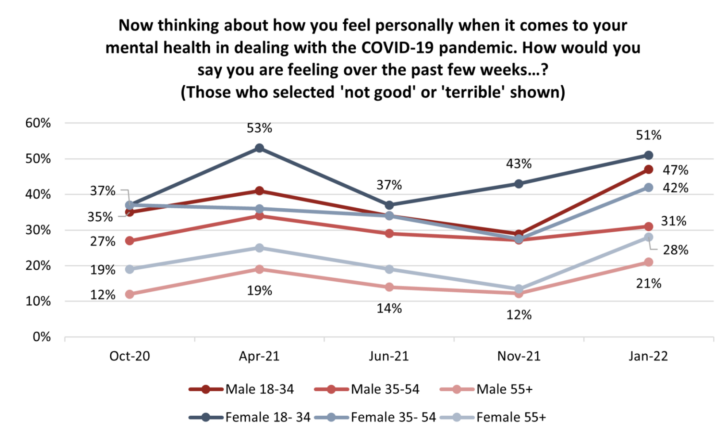
Income, too, appears to be factor. As Canadians have been dealing with the economic impacts of the pandemic, including inflation, those in lower income households are more likely to report poorer recent mental health (see detailed tables).
The mental health strains of the pandemic are also more acutely felt in the middle of the country. Two-in-five in Ontario (41%) and Saskatchewan and Manitoba (39%) say they are feeling not good or terrible in recent weeks, the most of any region in the country. That said, at least three-in-ten in all regions say they’ve been dealing with the mental health aspects of the pandemic poorly.
For every region in the country, fewer people report feeling “great” than they did in the summer and more people report feeling not good:
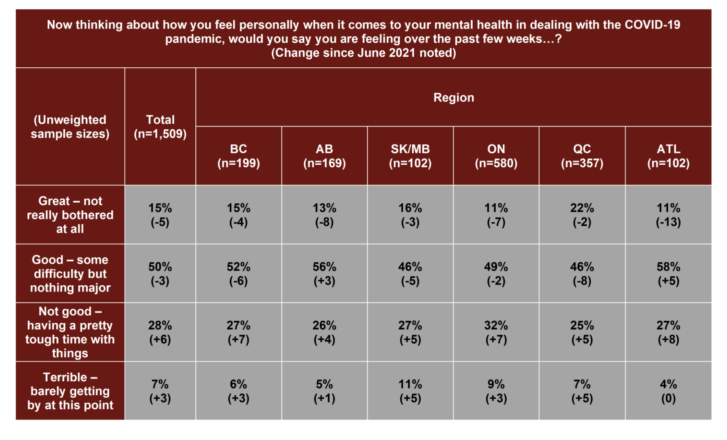
Half say they’re fatigued, many frustrated, anxious
The arrival of Omicron was a significant blow to Canadians’ mental health. Not only did its spread coincide with the holiday season forcing many to re-evaluate holiday plans to factor in the infectious variant, it also extended the timeline of the pandemic, making many wonder when the end will be. Half (51%) of Canadians don’t believe 2022 will be the last year of the pandemic.
No wonder then, that “fatigue” is one of the top-three words Canadians would use to describe their state of mind. When offered a selection of words to describe their feelings in recent weeks, half (48%) of Canadians select fatigued. Two-in-five say they’ve been feeling frustrated (40%) and anxious (37%) while few say optimistic (13%), happy (12%) or untroubled (8%):
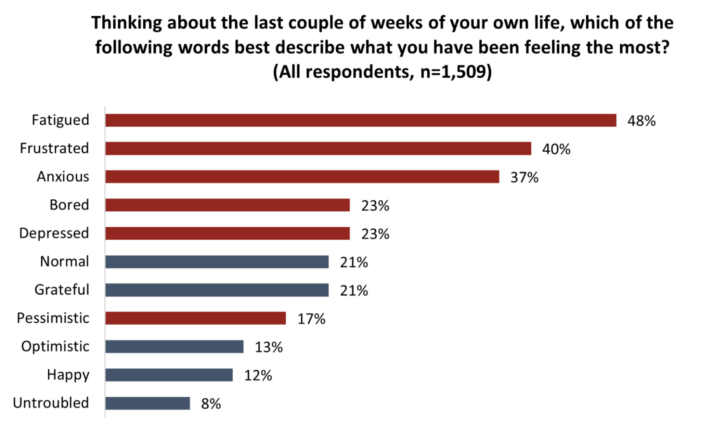
The spectrum of emotions is felt differently across age and gender lines. Women under 55 are the most likely of any group to say they’ve been feeling fatigued and anxious, though men under 35, too, are feeling anxiety much more than their older counterparts.
Men over 55 (27%) are the most likely of any demographic to say they’ve been feeling normal and also more than twice as likely (16%) as any other group to say they’ve been untroubled:
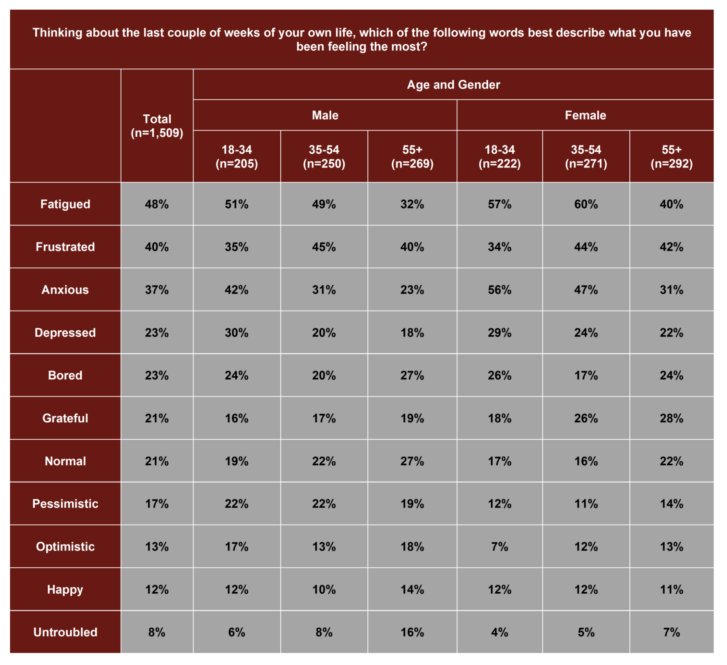
Part Two: Depression, anxiety, and addiction
One-third feel anxiety and depression ‘major problem’
As the pandemic has dragged on, clinicians say substance use has increased. Overdoses and alcohol-related deaths have risen since 2020, according to Statistics Canada, and doctors are noticing patients are drinking more than ever.
Half (47%) of Canadians say alcohol abuse is a problem among their social circle, while three-in-ten (29%) say the same of drug addiction. Anxiety and depression are even more prevalent. One-third (35%) of Canadians say anxiety and depression is a major problem in their social circle.
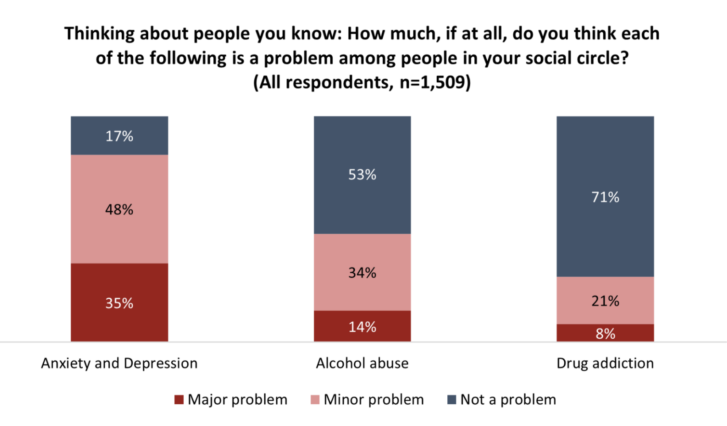
Anxiety, depression and addictions more prevalent among younger circles
Two-in-five men aged 18- to 34-years-old say anxiety and depression is a major problem among the people they know, twice the rate of men over the age of 54. That same ratio is also seen among women of those ages as half (52%) of 18- to 34-year-old women say anxiety and depression is a significant issue for their friends and family. Younger men and women are also more likely to report that alcohol abuse is a major problem for their social circle than their elders:
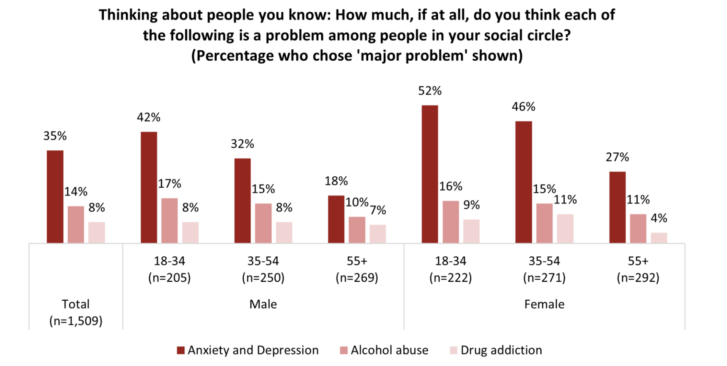
There are regional variations as well for those issues. Two-in-five (41%) in Saskatchewan, Manitoba and Atlantic Canada report anxiety and depression is a major problem among their social circle, the highest rate in the country. One-in-five (18%) in Saskatchewan and Manitoba also report that alcohol abuse is a significant problem among the people they know, also the most in the country (see detailed tables).
Two-thirds feel loved ones’ anxiety and depression have worsened during pandemic
Canadians believe anxiety, depression, and addictions have worsened among the people they know during the pandemic. Two-thirds (66%) of people who know others who are struggling with anxiety and depression believe the problems have worsened since March 2020, while few (3%) believe they’ve improved. Half believe the pandemic has worsened drug addiction (48%) and alcohol abuse (53%) in their social circle:
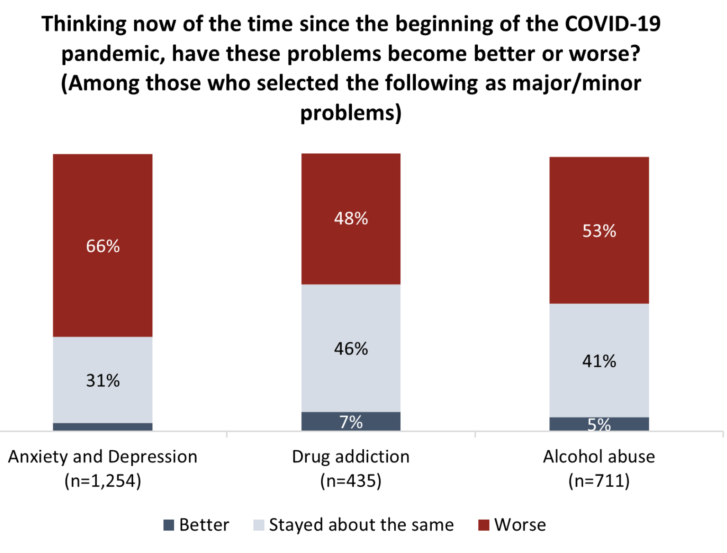
For younger Canadians, worsening mental health issues appear more common. Three-quarters of men (77%) and women (76%) aged 18- to 34-years-old believe the anxiety and depression they see in their social circle has worsened during the pandemic. While less likely than their younger counterparts, still half of men (53%) over the age of 54 and three-in-five women (57%) that age have seen anxiety and depression intensify among those they know:
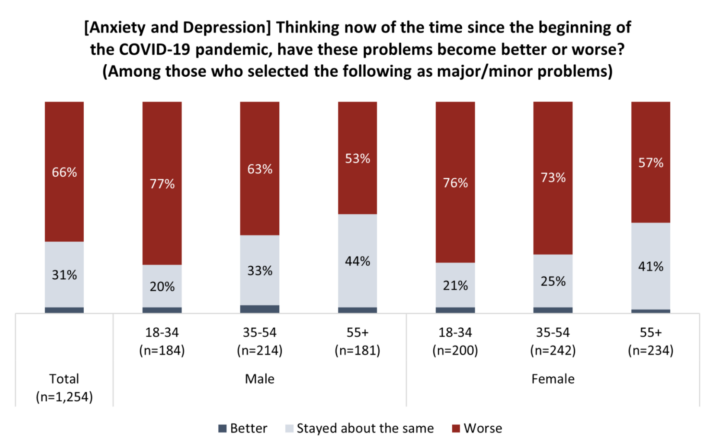
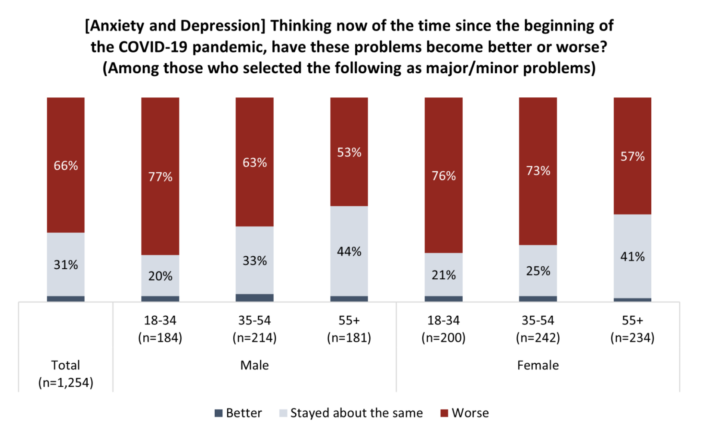
That trend is also seen for those who believe alcohol abuse is a problem among their social circles. Three-in-five young men (63%) and women (60%) believe drinking problems among those they know have increased since the beginning of the pandemic. For men over the age of 54, half (51%) believe it hasn’t intensified, but still two-in-five (40%) believe it has indeed worsened:
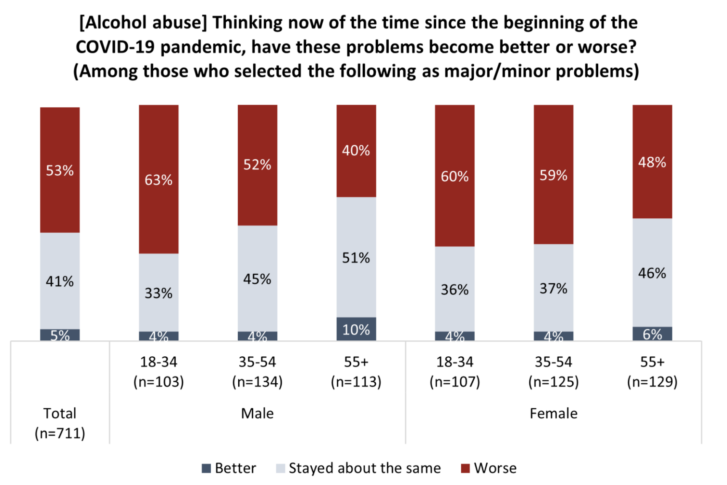
Part Three: Let’s Talk? Significant age and gender divides over who opens up
Three-in-ten Canadians say they often talk to their friends (30%) and family (32%) about mental health. One-quarter (25%) say they never discuss their mental wellbeing with their friends and one-in-five (21%) say it never comes up with their family:
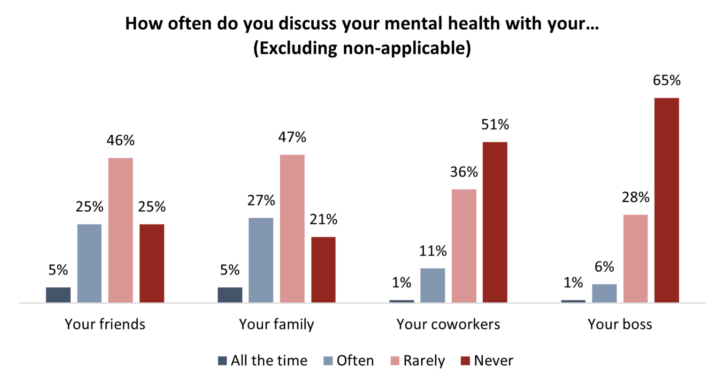
There is a significant difference in how often these conversations are happening across age and gender lines. Women are much more likely than men to say they discuss their mental health with their friends. Younger Canadians are more open about their mental wellbeing than older ones:
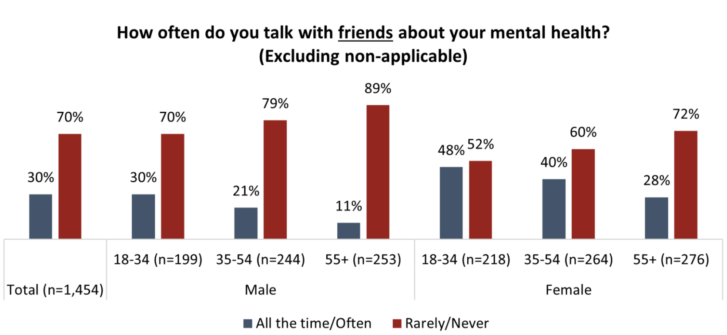
Women are also more likely than men to discuss their mental health with their family. It’s also more likely to be a subject of conversation for those under the age of 55 when compared to those aged 55 and older.
Notably, however, men over the age of 55 are twice as likely to say they talk about their mental health with family (23%) as friends (11%). For men aged 18- to 34-years-old, they’re as likely to talk about it with both groups (30% vs 27%).
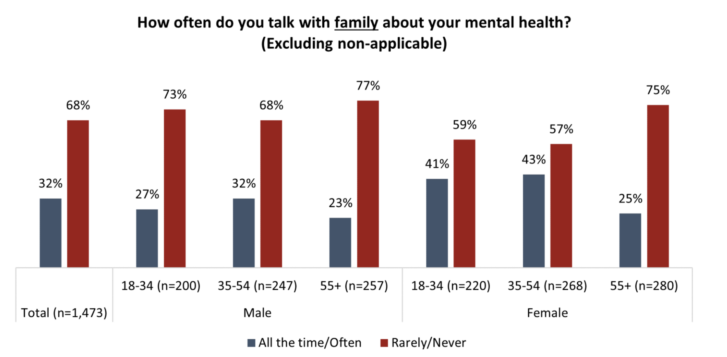
Loved ones are the most common resource Canadians lean on when it comes to their mental health. One-in-five (20%) say they or someone in their household talked to a friend, loved one or trusted person more than 10 times in the last 12 months about their mental state and seven-in-ten (68%) say they’ve done so at least once in the last year.
As for more professional options, three-in-ten (31%) report they or someone in their household has seen a therapist, psychologist or psychiatrist at least once in the last year, a similar number (30%) say they’ve received a prescription to treat a mental health issue in that time frame, one-in-ten (11%) say they’ve called a mental health hotline and eight per cent say they’ve gone to urgent care because of a mental health incident:
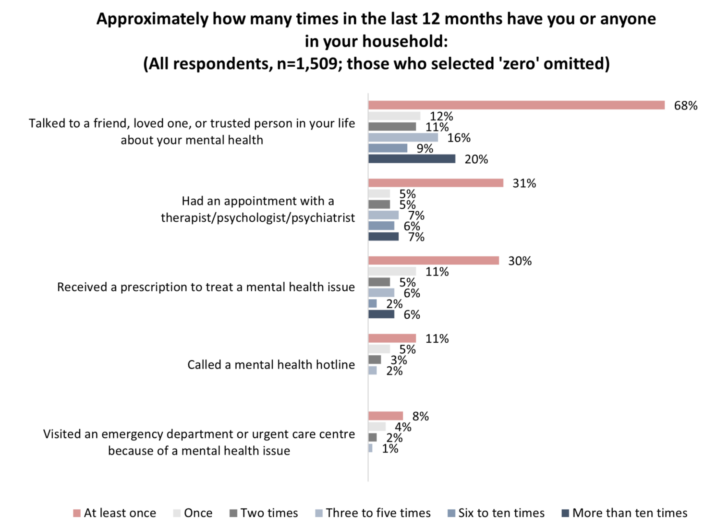
For detailed results by age, gender, region, education, and other demographics, click here.
To read the full report, including detailed tables and methodology, click here.
To read the questionnaire, click here.
MEDIA CONTACT:
Shachi Kurl, President: 604.908.1693 shachi.kurl@angusreid.org @shachikurl
Dave Korzinski, Research Director: 250.899.0821 dave.korzinski@angusreid.org
Article Source: Angus Reis Institute

